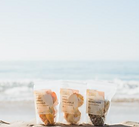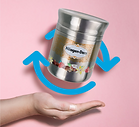

ONE MEAT FREE DAY PER WEEK FOR A YEAR CAN REDUCE YOUR CARBON FOOTPRINT BY THE EQUIVALENT OF SKIPPING A 348-MILE DRIVE
FOOD
FOOD
Local Farms and local Farmers Markets

Local farmers markets. The more local your food was grown the less carbon footprint it has. Find your market and get to know your growers. Choose organic over non-organic. And don't forget to bring your own bags!
Sun & Swell

Sun & Swell sells organic pantry staples in compostable plastic free packaging instead of plastic bags. Based in Santa Barbara they ship in compostable (and recyclable packaging). Their pantry staples bags do better in commercial composts and therefor they offer a send back program for all the bags. Save as you go and send back every few months. At checkout they offer a carbon offsetting calculated on your order. Find out more here. Oh, and don't miss out on their dried pineapple!
Tired of the plastic waste from your coffee pods? Wake up with Woken 100% compostable plastic free espresso pods. When the pod is used you can put the pod with your regular compost and it will be plant food within 90 days. Woken also sell ground coffee in compostable bags. Make your mornings planet friendly. Find out more here.
Imperfect Produce

At the moment 40% of all food in the US goes uneaten. Food worth $218 BILLION gets thrown out every year and 21% of our water supply is used to produce this wasted food. Imperfect Produce's mission is to eliminate food waste and build a better food system for everyone. They do this by delivering perfect imperfect produce to your door, produce that would have ended up in landfill due to it's size, shape or color otherwise. Included in their imperfect produce is also food which there may have been a surplus of, or undervalued food like broccoli leaves (someone needs to get kale's PR agent for them). Sometimes there's food that has a packaging change and the old packaged food become obsolete overnight, or a short coded product (meaning the best by date is less than few months away). You still get to pick and choose the food you want before each order. You can read more about their mission here.
Loop Store

All the well known household brands in re-usable packaging. Häagen Dazs, Clorox, Pantene, Tropicana, Tide and so on. Instead of throwaway plastic packaging, Loop packages in reusable packaging that you pay a deposit for, which is refunded when you return it. Loop will clean and re-use. All products gets delivered in reusable totes and to return schedule a free pick up. You can learn more about it Here.
Zero Grocery

Zero Grocery is what all grocery delivery should be. Zero plastic packaging. It really shouldn't be that hard. Reusable or compostable packaging for all your basic needs. Zero doesn't deliver all over the US yet but they do deliver in LA and Bay Area at the moment. See if they deliver in your area here. If not, there are other companies like them all over the country. Google to find out oof there is anyone like them where you live. Chances are there is!
The links above may contain affiliate links. If you purchase something through it, we may receive a commission at no extra charge to you.

